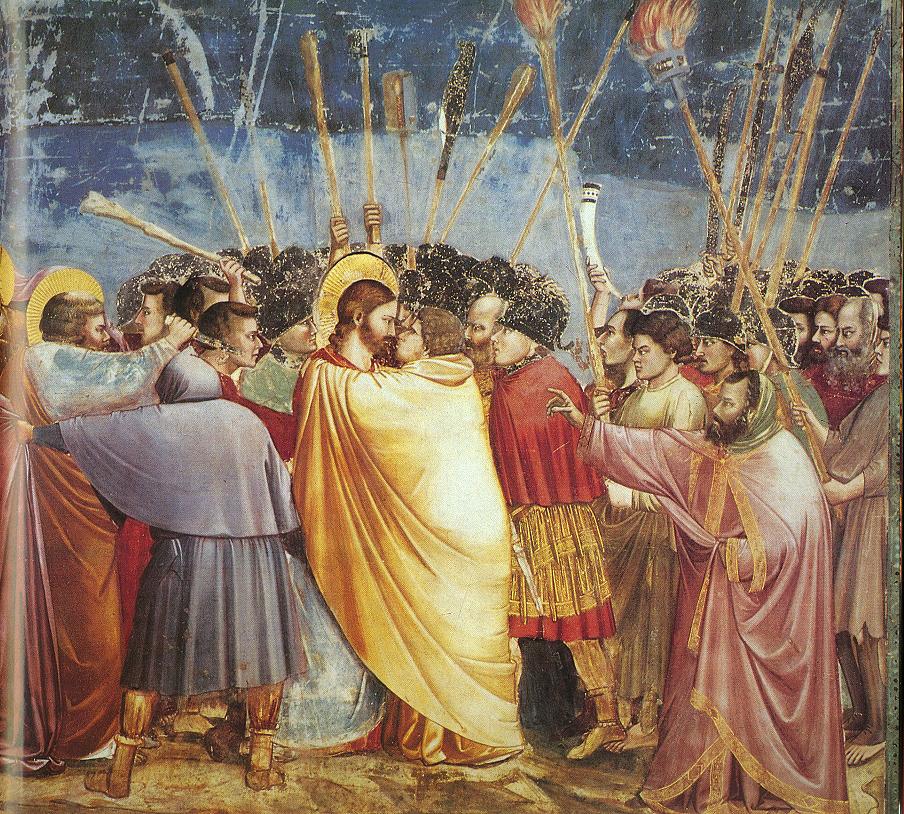“Then Satan entered into Judas called Iscariot, who was one of the twelve. . .” Luke 22:3
Judas has always fascinated me. We know so very little about any of the disciples, and of him least of all. How did he come to do what he did? What motivated him to betray Jesus? He was one of the twelve specially chosen ones. How could he be part of Jesus’ intimate circle and still harbor the dark, twisted pain that led him to sell Jesus’ safety for money? Didn’t Jesus understand what was going on in him and reach out in love, with healing? He certainly did for everybody else. How did Judas fail to open to that outstretched hand?
Judas is said to have been the keeper of the community purse, and in the Gospel of John he is accused of stealing from it. But maybe this is just an explanation settled upon by the Christian community long after the fact. Judas was not known at all to the second and third generation of Christians, for unlike the other disciples, he did not survive the Crucifixion.
There is such passion in the way he threw away the thirty pieces of silver in the Temple and then went and hanged himself. That’s what I imagine when I think of Judas: passion. I envision a great, passionate love turned bitter, turned into a burning hatred. I see Judas’ heart crying out to give itself to Jesus – and denied. Judas would have distrusted his heart; he followed the Law.
And maybe he was a Zealot besides, and he recognized that Jesus had the power and the charisma to lift Israel out of its subjection to the Romans. Maybe he was frustrated that Jesus was not that kind of Messiah. Maybe he decided to make Jesus choose power over love by putting him into the hands of the Romans. But beneath that motive I envision the murkier other: the desire to destroy what he could not embrace.
The moment, in this imagining of mine, when Judas’ passion turned to hatred would have been when Jesus healed the servant of the Roman centurion. “I am not worthy for you to come under my roof,” said that man, “but only speak the word and my servant will be healed.” I imagine Judas consumed with jealousy of the love between these two men, both attracted and incensed that the master would beg on behalf of the slave. These two were the Enemy and their relationship an unholy thing. I imagine the recoil in Judas – the retreat into spitting revulsion – not only for the centurion and his servant but for Jesus, the healer of all wounds.
Love is capricious and unruly, taking us places we would never go on our own. It is a dangerous fire, hard to carry in the fragile vessel of a human heart. Honoring it, we often find ourselves in a brand new country, alone and without moorings, our usual guides to behavior no longer applicable. And yet we are compelled to there. It is often not that we are asked to make love concrete in an intimate sexual relationship. In many instances that would be quite destructive. But we have to listen to what it tells us, what changes it demands of us. We are invited by it into a new identity, a new understanding, a fresh vision that bends us almost to the breaking point, like a strong bow.
If we do not honor love, it turns on us. In the darkness of our hearts it births the very acts most repellent to it; it destroys the Beloved. What is there left for us then? We retreat into denial or self justification. Or if we are too honest to do that we find a rope and hang ourselves.
Or maybe, God willing, we repent. We fall apart completely and we grieve. We weep for the Beloved we have destroyed. We weep at our own pettiness, cowardice, confusion, violence and viciousness. We ask for forgiveness, and feel the embrace of the God of Love. We break open after all, taking a different, even more painful path to that new country we were trying to avoid.
Oh how I wish that for Judas, that he would have taken the route of repentance. Jesus, too, must have wished that for him, wished it with all his heart. Because I have no doubt that Jesus loved Judas, and that he reached out to him over and over again. But Judas simply could not receive him.
Laurie Gudim is a writer and religious iconographer who lives in Fort Collins, CO. You can view some of her work at Everyday Mysteries
“Giotto – Scrovegni – -31- – Kiss of Judas” by Giotto – [1]. Licensed under Public Domain via Wikimedia Commons

